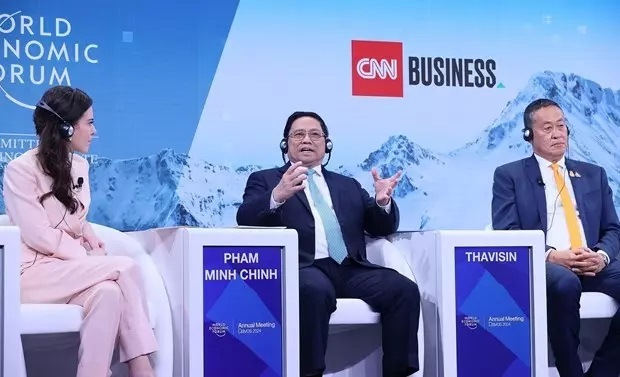What does the "White Paper 2024" reveal about Vietnam?
The White Paper 2024 recently published by EuroCham provides an insightful perspective on the Vietnam-EU trade outlook.
Vietnam Affirms Its Position in the Eyes of the EU
Launched on January 16, the report reflects the business perspective of member associations and sub-committees of EuroCham Vietnam regarding the Vietnamese market. It emphasizes significant growth and potential in bilateral trade and investment relationships.
.jpg)
Vietnam continues to emerge as an attractive investment destination for European businesses, largely driven by the EU-Vietnam Free Trade Agreement (EVFTA). This landmark trade agreement, which has played a critical role in this process, eliminates many tariffs and promotes a more efficient and accessible trade environment. The agreement not only boosts trade but also encourages sustainable development and higher standards in labor and environmental practices.
For European businesses, Vietnam's stable political environment, strategic geographical location, and dynamic young workforce are key factors in attracting investment from the continent.
Vietnam's trade surplus with the EU has continuously increased over the past two decades, from $1.3 billion in 2002 to $34.3 billion in 2023. Trade turnover has also seen growth in export value over the years with items such as textiles, footwear, seafood, coffee, computers, and electronics.
In 2023, the total trade turnover of goods between the EU and Vietnam reached $72.3 billion, a decrease of 5.3% compared to 2022 due to global circumstances but still significant in Vietnam's economy.
Affirming Vietnam-EU Relations
Especially since the EVFTA took effect in 2020, trade and investment from Europe have surged, particularly in renewable energy investments, promising to continue playing an important role in economic cooperation between the two sides.

The report indicates that Vietnam will continue to be highly regarded by European businesses in the future. Despite an economic downturn in 2023, FDI flow from Europe into Vietnam has increased over the year. Germany, the leading economy in the bloc, invested about $366 million in Vietnam, a significant increase from 2022.
Vietnam's role in the EU's green transition is noteworthy, especially with the Global Gateway initiative focusing on investment in ASEAN for green transition and sustainable connectivity. Vietnam's potential to supply necessary products for clean technology makes it a key player in diversifying and stabilizing global supply chains.
In the White Paper 2024, European businesses acknowledge Vietnam's promising market in the renewable energy industry, as Vietnam's green transition needs are seen as aligning with Europe's expertise and technology. Additionally, Vietnam's growing consumer market, driven by an increasing middle class, presents significant potential for consumer goods, technology, and services for EU enterprises.
However, challenges such as legal barriers and the need for infrastructure development partially hinder larger FDI inflows. The EuroCham Vietnam's "White Paper 2024" outlines key challenges, including legal barriers, bureaucracy, and the need for greater transparency and consistency in policy implementation. These issues are major obstacles for European businesses looking to enter the Vietnamese market.
The general view of EU businesses emphasizes the need to improve the legal framework and business environment to facilitate business operations. Addressing issues like intellectual property rights, tax and customs procedures, and the enforcement of regulations by Vietnam is crucial to attracting more investor interest.
The EU businesses' optimistic outlook on the Vietnamese market could be a "ray of light" in the negative prospects of the global economy. Vietnam will remain a strategic and important partner for the EU in Southeast Asia, part of broader strategies like the Global Gateway and the Indo-Pacific Strategy.
Significantly, Vietnam also highly values its relationship with the EU, not only in trade but also in regional matters like maritime freedom, which are seen as drivers to promote bilateral Vietnam-EU relations in the coming years.








